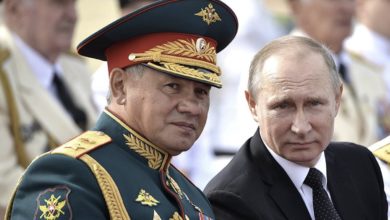On Aug. 17, three members of the Russian punk group Pussy Riot, Nadezhda Tolokonnikova, 22, Maria Alyokhina, 24, and Yekaterina Samutsevich, 30, were found guilty of “hooliganism” motivated by religious hatred” and sentenced to two years of hard labor, including time served. The announcement of the verdict sparked protests outside the courtroom and around the world.
Sergei Udaltsov, leader of the Left Front was arrested outside the courtroom as was Gary Kasparov, former chess master and leader of the Other Russia coalition. Kasparov alleges he was brutally beaten by police while being held in a police station.
What has been shocking to many is the severity of the sentence, given that the defendants have no prior records, and two are mothers of young children. In the aftermath of the verdict, even many of Putin’s allies have condemned it, and the Orthodox Church hierarchy has called for clemency. Lawyers for the three have alleged harsh treatment while the defendants were jailed prior to the trial. Moreover, the sudden announcement of a trial date left the defense team with only a few days to prepare.
The incident for which the three women were convicted occurred on Feb. 21. Members of the band entered Moscow’s Cathedral of Christ the Savior, possibly the largest Orthodox church in the world. Dressed in their hoods and short sleeveless dresses, the performers recited prayers, chanted and danced on the Ambo, a raised part of the church which is reserved for clerics and those assisting services. They were escorted by security from the church without resistance. Footage from this incident was included in the “Punk Prayer” video. Lyrics called upon the Virgin Mary to drive Putin from Russia, and included vulgar language likely to be perceived as especially offensive to churchgoers.
According to the defendants, the point of the Feb. 21 action was not anti-religious—it was meant to highlight the “close ties between the church and state” in Russia.
Feminism equals religious hatred?
To justify the determination of “hooliganism motivated by religious hatred,” Judge Marina Sirovaya outlandishly cited their “feminism.”
The judge found “a religious hatred motive in the actions of the defendants by way of them being feminists who consider men and women to be equal.”
The ruling added: “People who consider themselves feminists presently struggle for actual equality [for women]. These activities are not considered criminal in accordance with the Russian law … At the same time, Orthodox Christianity, and Catholic Christianity and other denominations do not agree with feminism and their own values are not inline with feminists.”
Under this legal interpretation, the church’s positions against feminism are to be protected while opposing gender inequality is ruled “religious hatred.” The logic of this ruling is akin to that of the U.S. Supreme Court decision allowing the Boy Scouts to exclude gays and lesbians in the name of religious freedom.
To be sure, the actions of Pussy Riot—dancing and shouting on the Ambo in immodest attire, using obscenities and mocking sacred rites—were deliberately intended to shock. It is clear that many if not most Russians, including secular and left elements, found the action very offensive. On the other hand, the church was mainly empty and the performers did not harm anyone or damage the church. The three women at no point threatened any believers or advocated violence against them. According to the participants, the point of the performance and the video they produced was to point out the mutually beneficial relationship between President Putin and the Russian Orthodox Church and expose the hypocrisy of church leaders. There has also been speculation that the members of the group hoped to gain publicity and ultimately greater financial success as performers as a result of their video.
The protection of religion
Marxists advocate for a completely secular state and a materialist philosophical outlook—as opposed to a religious one—but call for the protection of individuals’ right to worship. A guiding policy of the Communist Party of the Soviet Union was not to attack religious believers, but to deprive the church of the political power it enjoyed under the czar. By creating a “heaven on earth,” people would gradually and on their own move away from religion.
The “human rights” double standard
One cannot discuss the Pussy Riot verdict without looking at the case in the greater global context. A chorus of denunciation has arisen around the world from imperialist governments and bourgeois human rights groups such as Amnesty International and Human Rights Watch. Amnesty International called the verdict a “travesty.” “[It] shows that the Russian authorities will stop at no end to suppress dissent and stifle civil society,” said Michelle Ringuette, of Amnesty. The U.S. State Department said it was “concerned” by the ruling and urged a review of the case.
Much of the discussion of the Pussy Riot trial has portrayed the Russian government as a “vicious dictatorship” that does not allow free expression and abuses women activists. One need not be a defender of the Russian government’s policy regarding protests to consider the utter hypocrisy of those making these allegations in the so-called “free world.”
What might happen if activists in the United States conducted a similar action at the National Cathedral in Washington, D.C.? There is little doubt that people would be arrested, face jail time, fines and other charges.
Non-violent direct action—such as anti-war actions carried out at U.S. nuclear facilities—have sometimes resulted in multi-year sentences. Over 7,000 Occupy protesters were arrested in the last year and nearly every Occupy encampment was broken up by police forces across the country. This was usually justified with “public safety” considerations, but it generated no comparable outcry from Amnesty International or liberal celebrities.
Nor should we forget that the United States is the world’s largest jailer, locking up millions of people, disproportionately Black and Latino, for non-violent drug offenses with mandatory long-term sentences. Where is the internationally coordinated day of protest against this cruel criminal justice system?
While the U.S. government kills Pakistanis and Yemenis with drones, and has incarcerated a generation of youth here at home, who are they to be “concerned” about the harsh sentencing of three female punk rockers? While in the lead up to NATO’s 2012 meeting Amnesty International plastered Chicago’s streets with billboards praising the U.S./NATO occupation of Afghanistan, when it comes to Russia they pose as defenders of the world’s oppressed.
The goals behind the West’s demonization of Russia
The U.S. government and its allies in the NGO sectors are using this as an opportunity to demonize Russia at a time Russia’s foreign policy opposes U.S. and NATO machinations in the Middle East.
Russia is not pursuing a foreign policy based on revolutionary internationalism—far from it. But the Russians are currently following an independent foreign policy that advances the interests of their own bourgeoisie over the demands of western imperialism. The U.S. government hopes that the strengthening of Russia’s internal opposition, through international pressure and direct funding, will weaken the country’s obstructions to its own foreign policy objectives.
The Russian opposition
Russia is a capitalist country, in which workers are exploited for the profit of the capitalist class. Along with the massive plundering of state-owned enterprises by the new capitalist class of Russia came the destruction of the socialist social safety net. Since the overthrow of the Soviet Union, workers in Russia have seen their standard of living plummet.
Women have been especially impacted by the overthrow of the workers’ state. From full employment with health care and childcare and access to higher education, many women in the former Soviet Union are now being trafficked into the sex trade either domestically or internationally, as prostitutes and as mail-order brides because they have no other options.
Insofar as Russian opposition groups are engaged in genuine struggles for democratic rights or for socialism, progressives in the United States should support them. Their efforts to improve their conditions and form of government is not invalidated because the Russian state is currently in contradiction with the West.
On the other hand, some Russian opposition groups clearly aim to capitalize on the people’s legitimate struggles in order to bring to power a neoliberal, pro-Western trend. Within the “Other Russia” coalition, one finds communists, including those who seek the re-establishment of the Soviet Union, alongside nationalists and right-wingers. Also laying claim to the title of “opposition” are Western-oriented non-governmental organizations funded by the NED—in other words, semi-covertly by the United States. Pussy Riot and other art/protest groups are but one facet of the opposition.
We should stand against imperialism without turning our backs on the struggle of women and workers in the former Soviet Union. Rather than protect the country’s unity, the Russian state’s draconian sentence has only emboldened Orthodox conservatism, while handing hypocritical Western “human rights” groups an opportunity to mobilize worldwide.
The Russian opposition movement, united now only in their opposition to Putin, will inevitably divide as revolutionaries and anti-imperialists fight for leadership. The Party for Socialism and Liberation extends its solidarity to such forces, and can provide help here by exposing the U.S. government and its NGO lackeys as enemies, not friends, of the Russian people.





